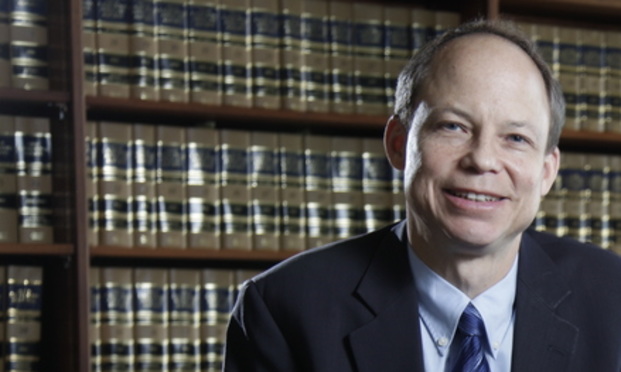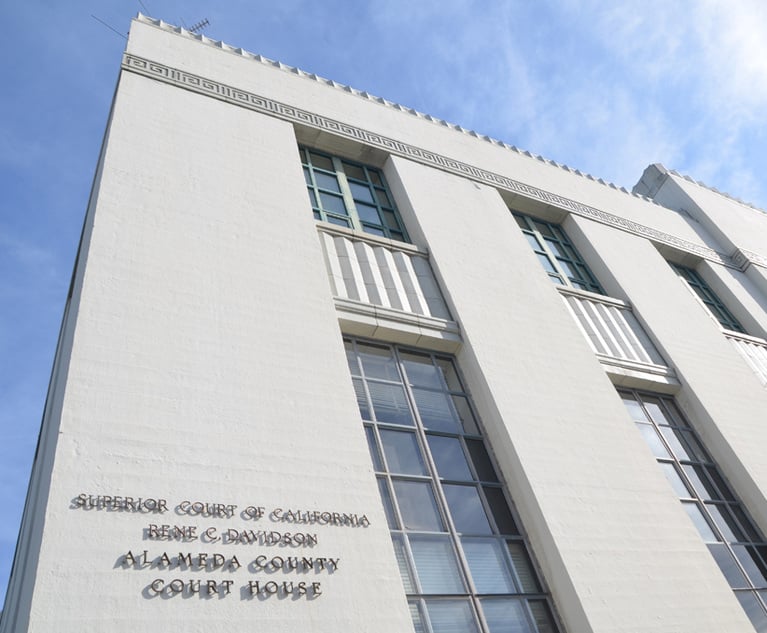Citing Persky Recall, Many Judges Want Power to 'Speak Out Freely' on Certain Cases
Still, other individuals suggested judges should not say anything about a case after issuing a decision.
December 20, 2019 at 02:24 PM
5 minute read
 Judge Aaron Persky. Credit: Jason Doiy/ ALM
Judge Aaron Persky. Credit: Jason Doiy/ ALM
A California Supreme Court advisory committee is weighing proposed amendments to judicial canons that would allow judges to speak publicly about a pending case if it's tied to election-related criticism of a judge.
Not surprisingly, many state judges think the proposed changes are a good idea.
Recently released public comments on the amendments to Canon 3B(9) drew praise from more than 250 current and retired judges. Many of them pointed to Santa Clara County Superior Court Judge Aaron Persky, who was recalled by voters in 2018 after he sentenced a Stanford University swimmer found guilty of sexual assault to six months in jail.
"The recall of Judge Persky from Santa Clara County need only be examined to see the pernicious effects of holding a judge mute in the face of repeated and widespread attacks on a single lawful decision made without bias," California Judges Association president B. Tam Nomoto Schumann said. "His inability to respond directly to the criticism created the perfect storm in the echo chamber of social media."
Not everyone who submitted a comment agreed with the proposed changes. Some individuals suggested judges should not say anything about a case after issuing a decision.
The Advisory Committee on the Code of Judicial Ethics, chaired by Justice Richard Fybel of the Fourth District Court of Appeal, is scheduled to meet Feb. 4 to consider the comments before making final recommendations on the amendments to the state Supreme Court. The changes, if approved, would take effect April 1.
Here are some of the comments submitted on the proposal.
>> Alliance of California Judges: "The proposed rule and commentary make it clear that judges should exercise restraint and no judge is compelled to make any public statement. We trust judges will carefully exercise this right. Judges may have more credibility than anyone else to speak to a controversial decision, and judges should be permitted to speak out freely on issues of judicial independence and the integrity of the judiciary. We urge the committee to restore to judges this important right of free speech."
>> Los Angeles County Superior Court Judge Paul Bacigalupo: "In the recent recall election of Judge Aaron Persky, the Commission on Judicial Performance took the unprecedented position of issuing a public report stating that Judge Persky committed no ethical violation in issuing the sentence in the criminal case that was subject of his recall election. However, because of the restrictions the Canons imposed on any judge from making a public comment that Judge Persky's decision was lawful and did not breach any ethical Canon, a judge, as the committee points out, may be reluctant to issue controversial decisions because they will not be able to defend themselves if attacked while the matter is pending. To allow any judge to comment on a judicial decision promotes public trust and confidence in the judiciary and the rule of law."
>> Sunil "Neil" Gupta, principal attorney to Chief Justice Tani Cantil-Sakauye: "I wonder whether it is easily ascertainable that a particular public comment by a judge, especially by the same judge who personally made the controverted decision, would have an effect on an impending proceeding, such as on an appeal of the very same decision."
Gupta made two other points, including: "The proposed amendments might unintentionally encourage judges to make less thorough records of their decision-making. … If adopted, the proposed amendment could de-incentivize a judge from providing a full explanation on the record for a particular ruling because any subsequent criticism of that ruling could be further explained through the judge's public comments."
And he added: "Finally … [w]ithout further definition, I am uncertain when precisely a 'recall campaign' would trigger the application of the proposed amendments. The language does not make clear whether a 'recall campaign' starts at the point at which signature collection has begun in order to qualify a recall measure on a ballot or whether the signature collection must be completed and verified to constitute the start of a 'recall campaign.'"
>> San Joaquin County Superior Court Judge Barbara Kronlund: "I think we can all agree that the successful and historic Persky recall was indeed a travesty of justice. Judge Persky could have been literally any judge, because all judges make controversial rulings from time to time. It doesn't mean the decisions are in any way unlawful, corrupt or biased ones; just unpopular in someone's opinion. And the real scary thing is that the people who want to oust a judge for one decision are almost always disgruntled litigants who could care less about the Rule of Law. Their sole goal is removal of the targeted judge, and they rarely let the true facts get in their way."
>> Retired Mendocino County Superior Court Judge James Luther: "Advice for a Judge About to Make an Unpopular Ruling. Explain it just once, Right there in your decision. Then sit down. Shut up."
This content has been archived. It is available through our partners, LexisNexis® and Bloomberg Law.
To view this content, please continue to their sites.
Not a Lexis Subscriber?
Subscribe Now
Not a Bloomberg Law Subscriber?
Subscribe Now
NOT FOR REPRINT
© 2025 ALM Global, LLC, All Rights Reserved. Request academic re-use from www.copyright.com. All other uses, submit a request to [email protected]. For more information visit Asset & Logo Licensing.
You Might Like
View All

Fresh lawsuit hits Oregon city at the heart of Supreme Court ruling on homeless encampments
4 minute read

Trending Stories
- 1'Lookback Window' Law for Child Abuse Cases Constitutional, State High Court Finds
- 2Troutman Pepper Says Ex-Associate Who Alleged Racial Discrimination Lost Job Because of Failure to Improve
- 3Texas Bankruptcy Judge Withdraws Ethics Complaint Against Jackson Walker
- 4Apply Now: Superior Court Judge Sought for Mountain Judicial Circuit Bench
- 5Harrisburg Jury Hands Up $1.5M Verdict to Teen Struck by Underinsured Driver
Who Got The Work
J. Brugh Lower of Gibbons has entered an appearance for industrial equipment supplier Devco Corporation in a pending trademark infringement lawsuit. The suit, accusing the defendant of selling knock-off Graco products, was filed Dec. 18 in New Jersey District Court by Rivkin Radler on behalf of Graco Inc. and Graco Minnesota. The case, assigned to U.S. District Judge Zahid N. Quraishi, is 3:24-cv-11294, Graco Inc. et al v. Devco Corporation.
Who Got The Work
Rebecca Maller-Stein and Kent A. Yalowitz of Arnold & Porter Kaye Scholer have entered their appearances for Hanaco Venture Capital and its executives, Lior Prosor and David Frankel, in a pending securities lawsuit. The action, filed on Dec. 24 in New York Southern District Court by Zell, Aron & Co. on behalf of Goldeneye Advisors, accuses the defendants of negligently and fraudulently managing the plaintiff's $1 million investment. The case, assigned to U.S. District Judge Vernon S. Broderick, is 1:24-cv-09918, Goldeneye Advisors, LLC v. Hanaco Venture Capital, Ltd. et al.
Who Got The Work
Attorneys from A&O Shearman has stepped in as defense counsel for Toronto-Dominion Bank and other defendants in a pending securities class action. The suit, filed Dec. 11 in New York Southern District Court by Bleichmar Fonti & Auld, accuses the defendants of concealing the bank's 'pervasive' deficiencies in regards to its compliance with the Bank Secrecy Act and the quality of its anti-money laundering controls. The case, assigned to U.S. District Judge Arun Subramanian, is 1:24-cv-09445, Gonzalez v. The Toronto-Dominion Bank et al.
Who Got The Work
Crown Castle International, a Pennsylvania company providing shared communications infrastructure, has turned to Luke D. Wolf of Gordon Rees Scully Mansukhani to fend off a pending breach-of-contract lawsuit. The court action, filed Nov. 25 in Michigan Eastern District Court by Hooper Hathaway PC on behalf of The Town Residences LLC, accuses Crown Castle of failing to transfer approximately $30,000 in utility payments from T-Mobile in breach of a roof-top lease and assignment agreement. The case, assigned to U.S. District Judge Susan K. Declercq, is 2:24-cv-13131, The Town Residences LLC v. T-Mobile US, Inc. et al.
Who Got The Work
Wilfred P. Coronato and Daniel M. Schwartz of McCarter & English have stepped in as defense counsel to Electrolux Home Products Inc. in a pending product liability lawsuit. The court action, filed Nov. 26 in New York Eastern District Court by Poulos Lopiccolo PC and Nagel Rice LLP on behalf of David Stern, alleges that the defendant's refrigerators’ drawers and shelving repeatedly break and fall apart within months after purchase. The case, assigned to U.S. District Judge Joan M. Azrack, is 2:24-cv-08204, Stern v. Electrolux Home Products, Inc.
Featured Firms
Law Offices of Gary Martin Hays & Associates, P.C.
(470) 294-1674
Law Offices of Mark E. Salomone
(857) 444-6468
Smith & Hassler
(713) 739-1250






